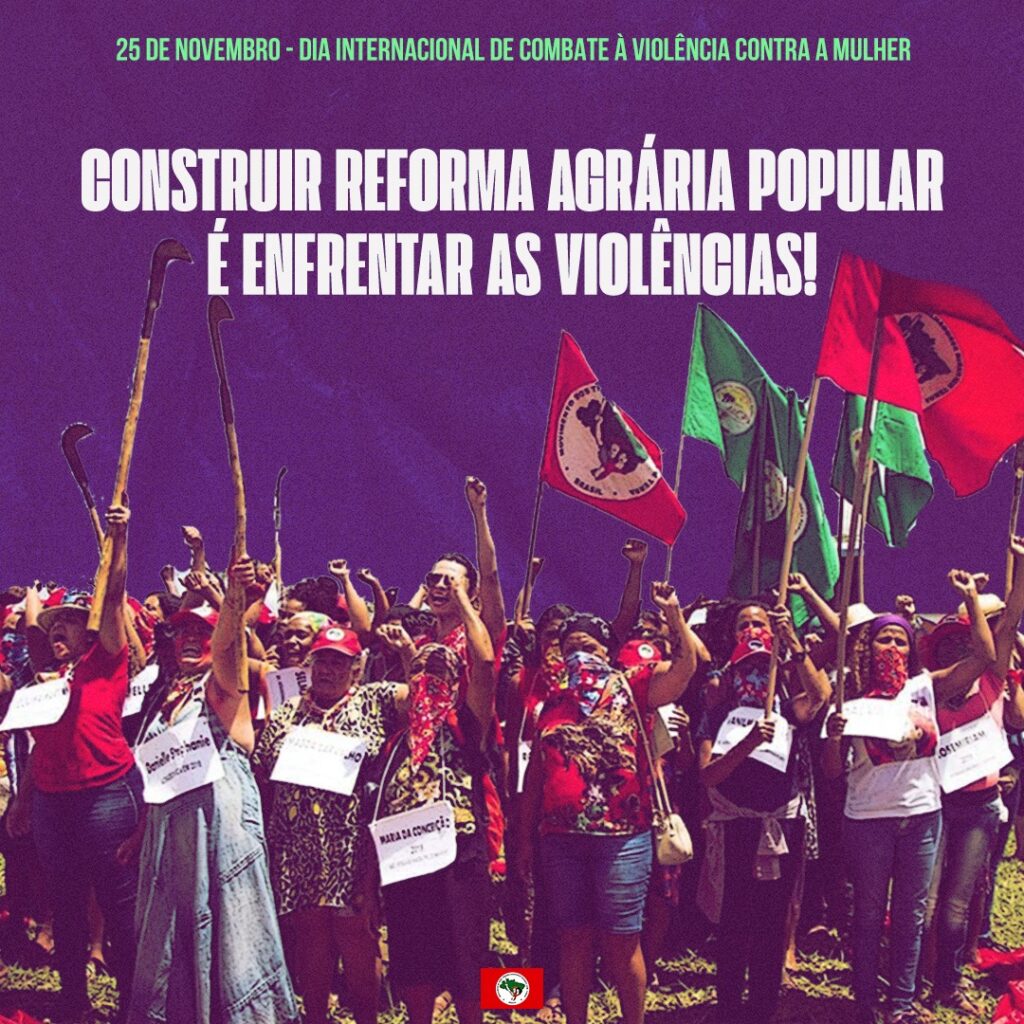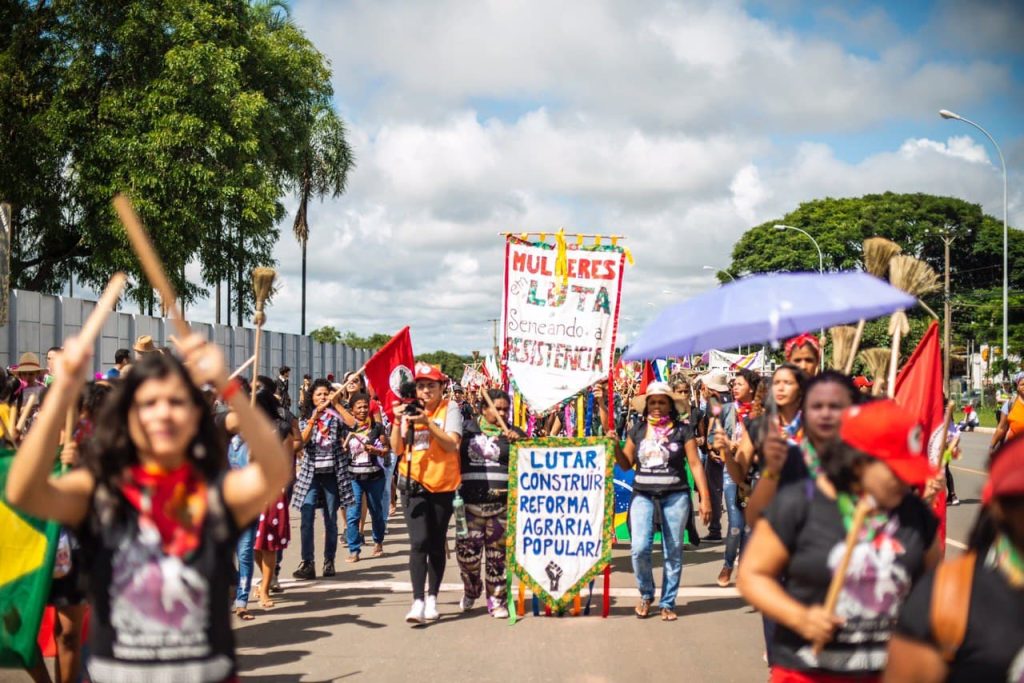On International Day to End Violence Against Women, the women of the Landless Workers Movement (MST) add to the actions of the peasant women of La Via Campesina.
November 25, 2022
By Solange Engelmann, first published on the MST Website
With the slogan “To Build Popular Agrarian Reform is to Confront all forms of Violence on this November 25th, International Day to End Violence Against Women, the women of the Landless Workers Movement add to the actions undertaken by peasant women all around the world, that make up La Via Campesina, in the fight to Eliminate Violence Against Women, For Food Sovereignty, For the Right to Land, and End to Criminalization and an End to all forms of violence in the countryside and in the cities.
In addition they focus on denouncing the food crisis and the political and economic crises that in Brazil, and all Around the world affect and violate mostly women but also vulnerable children and families in the countryside and in the cities. .
Honoring the Struggles of the Mirabal Sisters of the Dominican Republic
The 25the of November was designated a Global Day of Action in honor of the Mirabal sisters of the Dominican Republic who were assassinated because of their resistance to the dictatorship of Rafale Leonidas Trujillo. The bodies of the three activist women were found in the early 1960’s after they were tortured and assassinated by agents of the Trujillo government.
Violence against women has increased dramatically under Bolsonaro, in addition to becoming more lethal with the increased use of firearms against the lives of women and girls. According to data from the 2022 Annual Public Security Report, a woman (or girl) is a victim of rape every 10 minutes in Brazil. The majority were children and adolescents – 61.2% were between 0 and 13 years old. And on average three women are victims of femicide per day. In 2021, of 1,341 femicide crimes were recorded 62% of victims were Black. Violence also advanced among the LGBT community: today a trans woman is murdered every 2 days.
In the countryside it has not been different, between 2011 and 2020 there were 77 attempts and 37 murders of women due to land and environmental conflicts, in addition to aggressions, threats, rapes and other crimes of violence, indicates a survey by the Pastoral Land Commission (CPT).
“With regard to denunciations, we continue to affirm that the government of the last period resulted in many setbacks in terms of rights, but also in the forms of sociability of the Brazilian people, which had a direct impact on the lives of women, putting their objective and subjective existence at risk. In addition to demanding land and work, and objective living conditions, we fight for the right to exist in all the emancipatory possibilities that humanity allows us”, emphasizes Lizandra Guedes from the national coordination of the MST’s gender sector.
Throughout the month of November, together with the agenda to combat racism, MST women carry out a series of struggles and collective actions, confronting violence against women in the countryside and in the cities.
Check out more information in Lizandra Guedes’ full interview below:
This 25th of November 2022 , what are the principal critiques and demands of Women of the Landless Workers Movement (MST)?
The 25th of November this year awakens mixed feelings in us. The sadness for so many women, companions, that we lost as victims of violence, which has deepened in these four years of a government of hate, but also the hope that we can build new horizons for our lives.
Our motto on November 25th of this year “Building Popular Agrarian Reform is confronting violence”, says a lot about the way we have been challenging violence against women.
In the field of denunciation, we continue to affirm that the government of the last period resulted in many setbacks in terms of rights, which had a direct impact on women’s lives, putting their objective and subjective existence at risk. The so-called “customs agenda”, fueled by a discourse of the inferiority of women, one of the foundational concepts in Bolsonaro’s power- building project, poses great challenges to us in confronting violence. For this reason, as our motto of March 8th of this year announced, in addition to claiming land and work, objective living conditions, we fight for the right to exist in all the emancipatory possibilities that humanity allows us.
What kind of actions are being conducted by MST women on that date?
November is a particularly important month of struggles, as it links the feminist and anti-racist agendas. Our intention was to design a set of actions that could guide the issue of combating violence against women, but also hate based violence in general.
In this sense, we called on youth and rural schools to lead these themes with rounds of conversations and collages of posters, holding workshops and training spaces in our areas, with women (care and self-care workshops; self-defense, conversation circles; letter writing). And with the men, conduct training activities, which need to be built theoretically and methodologically with the women; and mixed training activities, including in schools, cooperatives, community organizations and other organizational and training spaces of the movement.

We also produced a series of materials for working with the Community bases of our movement through social media, as well as conducting an on-line National Assembly of Women of the Landless Movement in which more than 200 women from all over Brazil participated.
How has the MST taken action over the past years to confront all forms of violence against women?
Our Movement took the courageous and essential decision to commit to building this fight on a daily basis, whether through training, the base and militant activists, or through the creation of protocols that help us guide what to do and how to act when violence happens; promoting collective debate, organizing conditions for sheltering victims, providing measures in relation to aggressors. We advance in our organizing in the territories and among the militancy, promoting forms of coexistence between human beings and with nature, which reflect the project that we are building, of Popular Agrarian Reform.

How does the advance of agribusiness and deforestation in the countryside affect the lives of Landless Women?
The violence of capital, exemplified in the destructive practices of agribusiness, directly affect the material and subjective lives of women. Its cruelest facets are hunger, the toxic poisoning of food and natural resources, the land grabs and dislocations forced by conflicts and sexual violence against women and girls.
The Agribusiness project is a project of death and, acknowledging this, the struggles of landless women center the fight against the deadly practices of agribusiness.
What challenges remain in the fight against violence in the countryside, and how are the Landless Women organized to move this fight forward in the coming period?
The challenges are not few: we have the task of recovering lost rights, claiming our agendas to advance the Agrarian Reform, fighting hunger and strengthening the fight against violence. And we will only achieve this through a lot of political education and feminist training with our base, with the objective of strengthening popular organizing, not taking our foot off our role as a Social Movement, which is to promote struggles for a popular project in Brazil, to become an egalitarian country without hunger, and with land for those who want to build their existence on it in harmony with the environment and without violence.
The aromas of March are already in the air, announcing that we will create a sea of flags.

